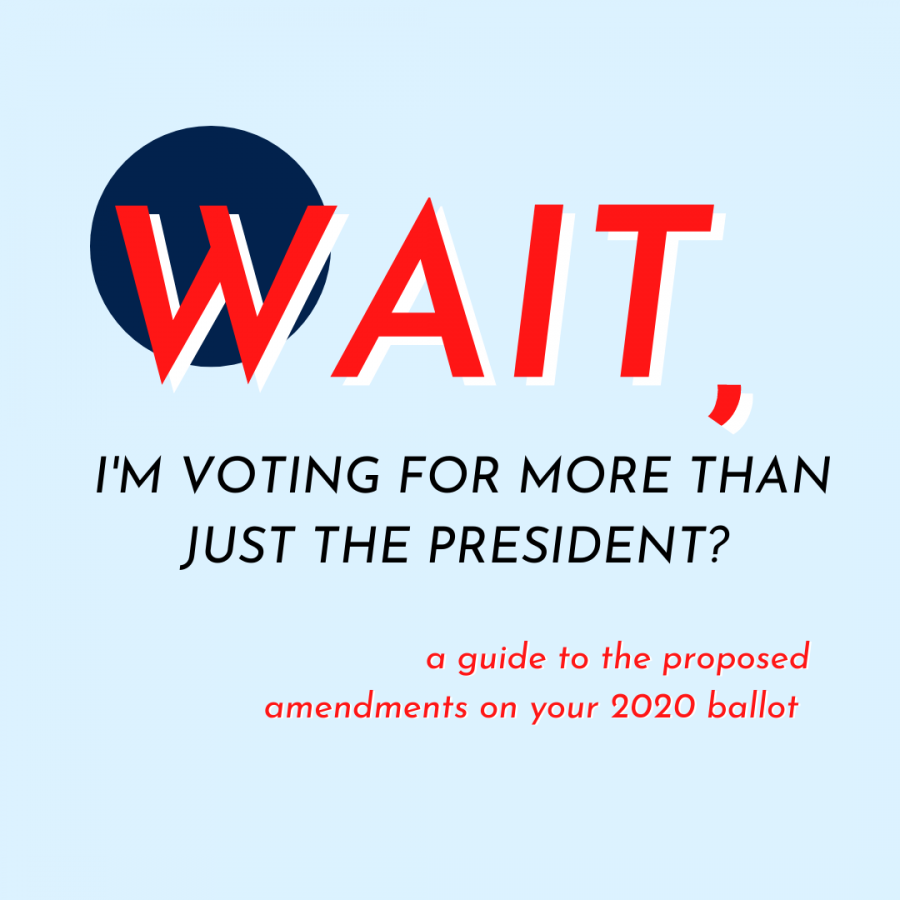Wait, I’m Voting For More Than Just the President?
A Guide to the Proposed Amendments on Your 2020 Ballot
The 2020 election has been contentious, to put it mildly. Because that contention centers around the battle-royale for the presidential seat, it’s easy to forget that your ballot will have other races and other issues that could use your attention. Below, you’ll find a breakdown of the amendments on the ballot this election, that way you can walk into that socially-distanced voting booth well-informed.
- Citizenship Requirement To Vote In Florida Elections
What This Amendment Says: The Florida Constitution currently states that “Every citizen of the United States who is at least eighteen years of age and who is a permanent resident of the state, if registered as provided by law, shall be an elector of the county where registered.” The proposed amendment would change this by stating that “Only a citizen of the United States…shall be an elector of the county where registered.”
What This Really Means: One must be a citizen of the United States and registered in Florida to vote, so the amendment is simply a campaign to tweak the verbiage sound more exclusive than inclusive while not actually changing the enforcement of any laws or policies.
The Pros and Cons: Those for the amendment, like Florida Citizen Voters, argue that it’s a necessary change to prevent non-citizens from voting in U.S. elections. Those against it, like the League of Women Voters, argue that the Florida constitution already does this, meaning the amendment is unnecessary.
- Increase minimum wage to $15 by 2026
What This Amendment Says: This amendment would increase the minimum wage by $1 per year on September 30th starting with $10.00 in 2021.
What This Really Means: The minimum wage would increase by $1 increments from $10 in 2021 to $15 in 2026.
The Pros and Cons: Many groups are fighting for a living wage so that Floridian’s can better afford their day-to-day expenses. Many small business owners are worried that they won’t be able to afford to keep up with the yearly minimum wage increase and will end up having to layoff employees, cut hours, or more quickly adopt automation. The state government warns that the fiscal impact will be passed onto individuals in the form of increased taxes to compensate for the wage hikes.
- Allow All Registered Voters, Regardless of Party, to Vote In Florida Primaries
What This Amendment Says: Create a top-two open primary system for state officials and legislators. All Voters Vote in Primary Elections for State Legislature, Governor, and Cabinet
What This Really Means: This amendment would do away with party exclusive primary nominations. Instead of only registered republicans or democrats voting in their own parties primary, all voters whether they are affiliated with a party or not, would vote in one big primary where the two candidates with the most votes move onto the general election.
The Pros and Cons: Supporters like Immigration Partnership and Coalition (IMPAC) point out that ⅓ of Florida voters are not registered as a republican or democrat and are therefore excluded from the primary process where we select which candidates will vie for the position in the general election. Supporters hope that having an open primary will encourage candidates to appeal more towards the people at large instead of only to their own party. Opponents like the ACLU and NAACP worry that an open primary system will stifle minority representation as white voters can “bleach” the field, reducing minority voting power. The League of Women Voters supports the open primary system as they believe it would broaden political participation, however they oppose this amendment because it stipulates that only the top two candidates will move onto the general election, a move they see as too rigid and too easy to split the votes of one party over another.
- Require Constitutional Amendments to be Passed Twice Before Adoption
What This Amendment Says: In Florida, an amendment requires a 60% constitutional majority vote at an election in order to pass into effect. This amendment, proposed by the Keep Our Constitution Clean political committee, would require “. . .all proposed amendments or revisions to the state constitution to be approved by the voters in two elections, instead of one, in order to take effect. The proposal applies the current thresholds for passage to each of the two elections.”
What This Really Means: Currently, an amendment only needs to pass one election to make it on the books. This amendment would require a proposed amendment to pass a second general election before becoming effective. Essentially, the amendment must receive a 60% constitutional majority vote at two separate elections before being passed.
The Pros and Cons: Supporters—namely, the Keep Our Constitution Clean PC—assert that the bill would “reduce the amount of. . .whimsical constitutional amendments.” A lawyer from the organization believes that the state of Florida has passed a superfluous amount of ballot measures (compare 140 since 1960 to the US Constitution’s 27 since 1787). Detractors, like the League of Women voters, believe that the amendment would limit citizens’ ability to amend their constitution and pose a threat to direct democracy Floridians by making it much harder to pass amendments.
- Increase Limit on Homestead Exemption
What This Amendment Says: The Florida Constitution currently states that “A person who establishes a new homestead. . .who has received a homestead exemption pursuant to Section 6 of this Article as of January 1 of either of the two years immediately preceding the establishment of the new homestead is entitled to have the new homestead assessed at less than just value.” This amendment would read “any of the three years” instead of “either of the two years.”
What This Really Means: This bill is deceptively difficult to follow! Currently, permanent in-state Floridian residents receive a tax benefit which allows them to pay taxes on a value which is $25,000 less than the home’s assessed value (if a home were worth $225,000, for example, the homeowner would pay as though the house were worth $200,000). Upon selling a primary residence, Floridians can transfer these benefits to their new home within the first two years post-sale. This bill seeks to expand that time from two years to three years.
The Pros and Cons: Supporters of the amendment, such as the Tampa Bay Times Editorial Board, suggest that the extension would benefit voters who might be affected by the time their homes are finished being built, and would allow all homeowners to benefit from the exemption. The League of Women Voters, however, will be voting “no,” citing the reduction in property tax revenue (and, thus, in local funding for school and emergency services) as the reason for their opposition. The Florida Revenue Estimating Conference estimated that passing the amendment would cause a $1.8 million reduction in local property tax in 2021.
- Tax Discount for Spouses of Deceased Veterans With Combat-Related Disabilities
What This Amendment Says: The amendment seeks to expand laws regarding homestead tax discounts by extending it to the surviving spouses of deceased veteran “. . .if the surviving spouse holds the legal or beneficial title to the homestead property and permanently resides thereon.” If this is the case, “the discount carries over to the surviving spouse.”
What This Really Means: Amendment six addresses homestead tax benefits received by veterans with permanent service-related disabilities. Currently, should the veteran pass away, their spouse cannot receive their homestead benefit. This amendment would carry the tax benefit over to a surviving spouse until the spouse remarries or sells the property, where it could potentially be transferred over to a new property. This bill would ultimately result in a reduction of local property tax revenue.
The Pros and Cons: The Sun Sentinel Editorial Board expressed support for the amendment by stating that its costs are “. . .not too much to pay for people who served the country at such cost to themselves. . we see it as particularly benefitting widows or widowers who want to relocate or downsize after the deaths of their spouses.” Supporters stress that the amendment would serve those who serve the US and their families. Opposition to the amendment is largely concerned with a loss of property tax revenue; the League of Women Voters suggest that the amendment would limit the budgets of local governments and would cut funding to local schools.
Check out this story and much more on the election in Issue 2 of The Reporter, available now here.

Jay Stearman is an opinion writer for Hatter Network. He is an Environmental Studies major and hopes to become a sustainable agriculture leader after he...

Hannah Zeller was the Executive Editor of The Reporter from 2019 to 2020. She is an ardent consumer of baked goods, a connoisseur of reality television,...







